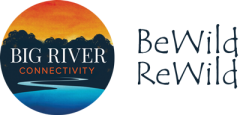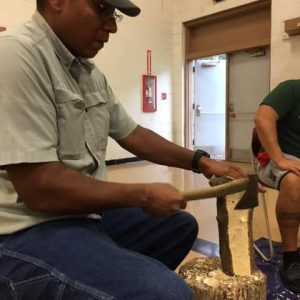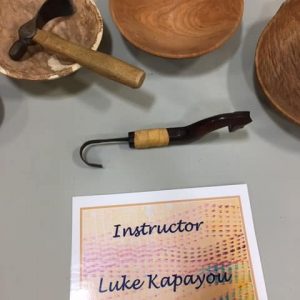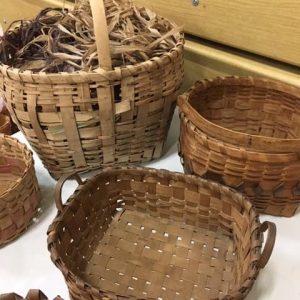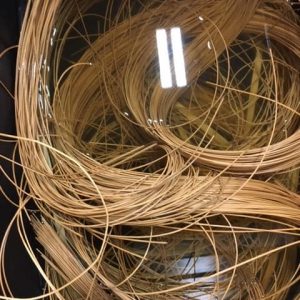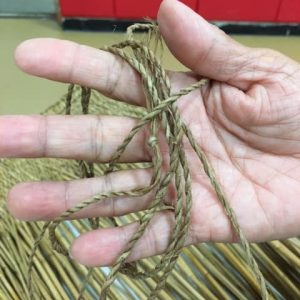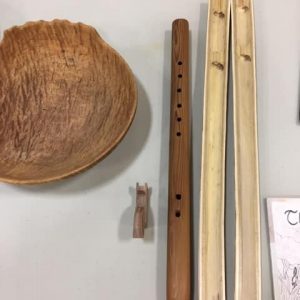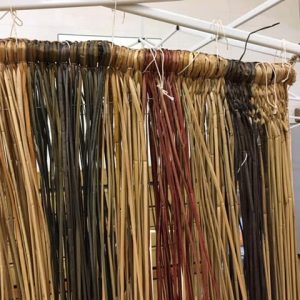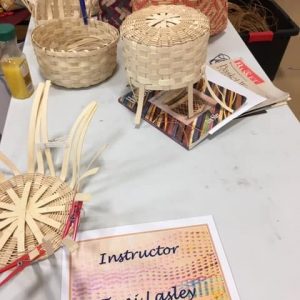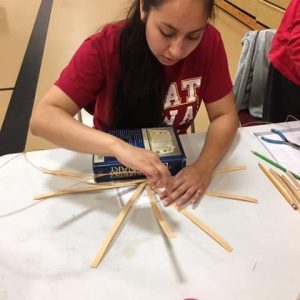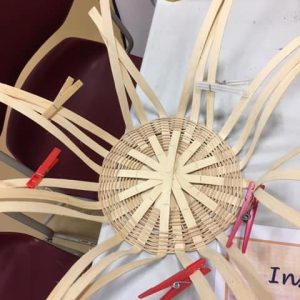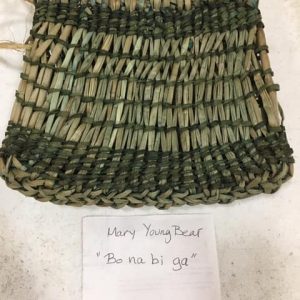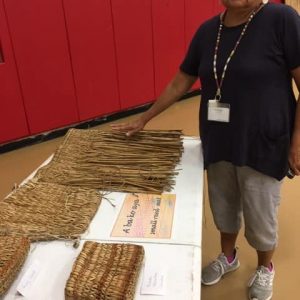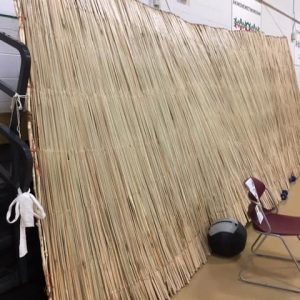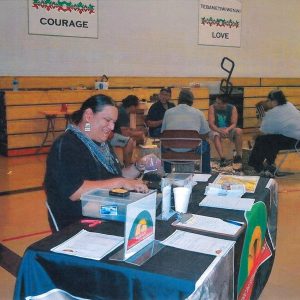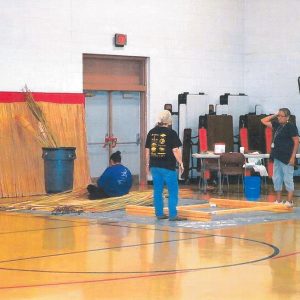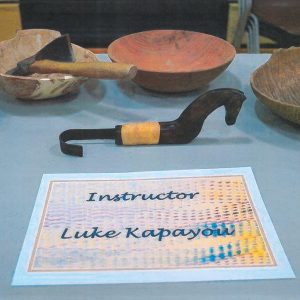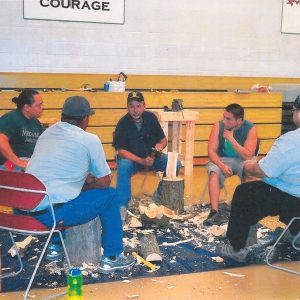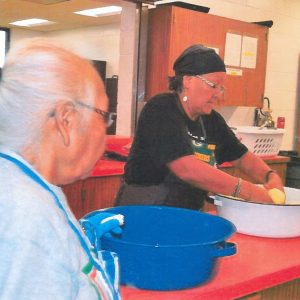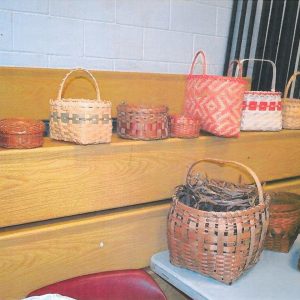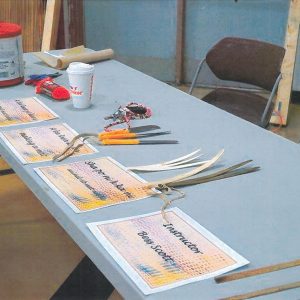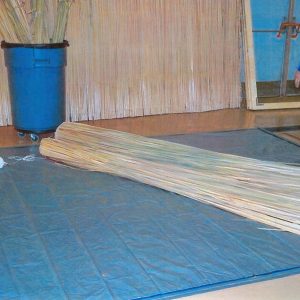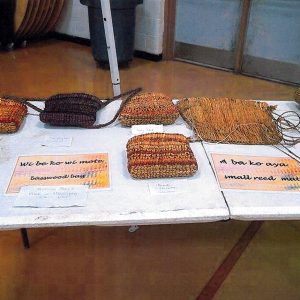Meskwaki Natural Traditions Workshops
Developed by Mary Young Bear. Workshops on basket making, twined bags, cattail mats, bone dice, and wooden bowl/spoon carving. Held at the powwow grounds September 21-22.
The Meskwaki Traditional Arts Workshop was successfully held as planned on the dates originally set, However, the location was changed to an alternate site due to weather conditions. We moved to the Meskwaki Tribal Gym from our original site of the Meskwaki powwow grounds. The space proved to be a good choice for this historic event.
This is first time that community members were gathered together at one time, under one roof to experience our old methods of creating utilitarian items, which can develop into artistic expression as skills are perfected. There were some methods that haven’t been practiced in decades, while some never left us. For two days, community members came together to see, participate and create the same items their ancestors did as far back in time as we can remember. The following projects were offered to the community:
- Wood carving (spoons) with Luke Kapayou
- Basketry with Toni Lasley
- Twined bags with Nina Young Bear and Kelly Schott
- Plant Fiber cordage with Kelly Schott
- Cattail Mats with Bessie Scott
- Bulrush weaving with Nina Young Bear, Brenda Wanatee and LeAnn Morgan
Participants were able to begin their individual projects on Saturday, and return Sunday to complete their work. One complete Cattail mat was finished with several individuals, including a 7 yr. old girl working on it. Several baskets were completed along with 8 wooden spoons. Four women were introduced to weaving bulrush bags, with three new bags being completed, and many people stopped by just to observe and ask questions.
What is so great about this project is that we were able to provide instructors from this community. We did not have to seek out individuals from other communities. For the first time in decades, we have people right here that have learned how to harvest, clean, process and weave with both cattails and bulrushes. We have people that have learned how to make twined bags as well as baskets. These are art forms that were forgotten among our people, but have found their way home. We will continue to strengthen our skills throughout the winter months , and introduce these art forms to more community members.
A traditional meal was provided for everyone each day, cooked by Meskwaki women. This food was blessed with prayer and this meal helped to create the overall sense of welcome to everyone present. Whether a guest worked on an individual project, a group project or came out of curiosity, they were met with gracious smiles and gratitude for their presence.
Our number of instructors is small, but one year ago, we didn’t have any bulrush weavers, seven years ago nobody knew how to make a cattail mat. We have been able to create an interest in these art forms, and our community see’s the importance of keeping these practices alive. Our efforts will not end with this event, this event has only made us more determined to share what we know.
Mary Young Bear- Bonabiga
Project Director
1. What is Wild?
Life is always in flux. Natural processes and resting states are continually impacted by ever-changing conditions. Some impacts are slow and gradual, some are swift and sudden, some are mighty, some are tiny, some impacts are temporary, and some are permanent. Anything “wild” is not unchanged from what it was before and no “wildness” is unchangeable by the future.
A natural system is not less wild because it has changed, like when a river makes a new channel, but a natural system can become degraded and can die if the parts of it are broken or disappear, or are poisoned or even just cease to be respected or valued. A natural system, a wild system, is a dynamic creature that has a memory and has emotions and seeks balance and to live on, just like any other creature does in an ever-changing world. By respecting and accepting that wild, natural systems have a tight to seek equilibrium and quality of life in an ever-changing world, we allow ourselves the right to the same. The Native people understand that natural systems are comprised of layer upon layer of complex systems of relationships, from the sublime to the imperceptible, and respect this complexity. The Meskwaki Tribe, for example, understood the value of a healthy Iowa River water—way system and purchased land on both sides for the river to decide for itself what it wants to do with it. Sometimes the river reaches way up onto the land during a flood, using the land to absorb the rising waters. Our upstream and downstream neighbors, on the other hand, build dikes to keep the water away, each dike just a bit higher than the one on the opposite side of the river. This doesn’t seem like a very good idea to us, on so many, many levels. It’s been our experience that we are better off as a people if we respect that a river is best left to be the river it is trying to be. A river system, a wild river system, helps us stay strong as a people and helps keep us connected to each other, our ancestors, and all the other things that share our world with us.
By focusing on and remembering our natural traditions, those that come from strong natural systems, we will ourselves be stronger as we respond to change in our world. The traditional homes, utilitarian wooden implements, ash baskets, our game pieces for bone dice, and other parts of our culture come from the uncultivated environment of wherever our Meskwaki people have lived. I would like to devote two days toward the continued revitalization of the traditional practices of the Meskwaki people. Along the banks of the Iowa River at our powwow grounds, we could have workshops to engage our community in the arts of : basket-making, twined bags, cattail mats, carving wooden bowls, carving bone dice and weaving bulrush mats.
All of these items were made from locally harvested elements which served the basic needs of our people, yet these items are infused with the prayers, the imagination and the artistic interpretations that come from our souls.
2. What lifestyle changes do we need to make to live sustainably?
Education, first of all, among the Meskwaki people and our community, we should use our history to illustrate how our culture revolved and depended on all of the elements of nature. How being able to trade with other nations along the rivers created our economy while it sustained our way of life. We hunted, we fished, grew our crops, tapped trees for sap to make syrup, trapped for fiars and we foraged the local trees and shrubs for food and medicine. Having the knowledge of how our ancestors survived can and will be motivation for us to utilize our traditional knowledge on a day to day basis instead of reading about it. We need to think of a world without electricity and without dependency of fossil fuels. We have to look towards our past in order to see to our future.
3. How can we create a wilder more beautiful, more biologically
diverse and more enduring Mississippi River Watershed (western rivers)?
We have to be advocates on behalf of all our waterways, to hinder pollution of our waters from corporate agriculture, and the potential disaster from the oil pipelines that run under land and water. For the Meskwaki community, I see us living our lives as our ancestors did, while we no longer actively trap for furs, we can still fish and we are once again learning how to harvest cattails and bulrushes to weave into mats for traditional homes. We celebrate our annual harvests along the banks of the Iowa River during the Meskwaki Powwow. It is here in the area of our original purchase of eighty acres that we will gather to embrace our history, to share our traditional knowledge of survival, and see the importance of maintaining the natural gifts of our land and water.
Budget for Meskwaki INHF Grant Proiect: Traditional Arts Workshop
Meskwaki Settlement. Tama, Iowa. Meskwaki Powwow Grounds
Early Fall 2019
Basket Making Instructor — Toni Lasley
Supplies $200
Honoraria $200
Twined Bags Instructor — Nina Young Bear
Supplies $200
Honoraria $200
Bone Dice Carving Instructor — Johnathan Buffalo
Supplies $200
Honoraria $200
Cattail Mats Instructor — Bessie Scott
Supplies $200
Honoraria $200
Wooden Bowl/Spoon Instructor — Luke Kapayou
Supplies $200
Honoraria $200
Bulrush Mats Instructor — Crystal Migwans
Supplies $200
Honoraria $200
Travel& Hotel $300
Total = $2700
Lunch for (60) people for 2 days
Day 1
Buffalo Chili
Fruit
Frybread
Drinks
Total- $200
Day 2
Soup
Frybread
Fruit
Drinks
Total- $200
2-Cooks
$200 for 2 days
$200 for 2 days
Bottled water will be available all day for both days
$ 50
Paper products (Napkins, bowls, cups, paper towels)
$60
Total for meals=$910
Portable Toilet Service
5 Regular Units x 2 days =$450
l-ADA unit x 2 days = $175
Total =$625
Documentation
Photography for 2 days =$400
Written essay— $ 100
Total=$500
Printing Costs
Flyers
Labels
Posters
Total=$265
Total Expense for 2 days=5000
